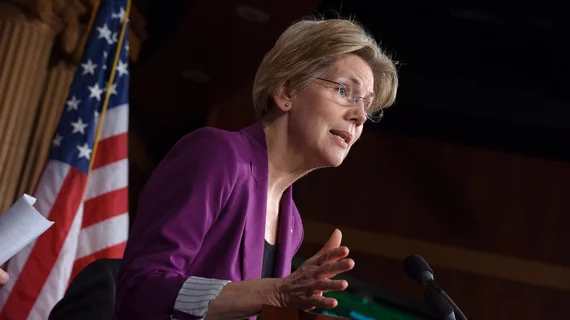Members of Congress introduce bill to halt private equity ‘looting’ of healthcare entities
Members of Congress on Thursday reintroduced a bill aimed at stopping private equity firms from “looting” entities in healthcare and other industries.
Sen. Elizabeth Warren, D-Mass., and colleagues in the U.S. House and Senate said the Stop Wall Street Looting Act closes regulatory loopholes and ends incentives that allow investors to “pillage” acquired businesses. Lawmakers’ ire stems, in part, from PE firm Cerberus Capital Management’s acquisition of hospitals in Massachusetts and elsewhere.
The investment firm saddled the institutions with debt while padding its pockets, leaving vital community pillars in ruin, Warren and colleagues contend.
“Private equity takeovers are legal looting that make a handful of Wall Street executives very rich while costing thousands of people their jobs, putting valuable companies out of business, and in the case of healthcare, is literally a matter of life and death,” Warren said in a statement shared Oct. 10. “Our bill is designed to close loopholes and end incentives for private equity pillaging—and it will make sure what happened at Steward never happens again.”
Since 2020, private equity funds have grown nearly 78%, from $4.5 trillion up to $8 trillion last year, lawmakers noted. They’ve purchased companies in nearly every sector of the economy, including radiology practices, nursing homes, newspapers and grocery stores, “laying off hundreds of thousands of workers and ruining thousands of companies in the process.” Often, these firms load companies with “mountains of debt,” strip them of assets, and extract “exorbitant” fees and dividends.
“When their debt-ridden investments go belly-up, private equity funds walk away with no responsibility for the mess they create, leaving workers in the lurch and forcing communities to clean up their mess,” lawmakers noted.
To address these problems, the Stop Wall Street Looting Act would:
- Require investment funds to have ‘skin in the game’: Forcing private equity firms and their partners to be on the hook for the liabilities of companies under their control, including debt, legal judgments and pension-related obligations.
- End ‘looting’ of portfolio companies: Limiting how much private equity firms can extract from companies and closing the loophole that PE firms have used to hide assets from bankruptcy courts.
- Protect workers, customers and communities: Preventing PE firms from walking away when a company fails and shielding employees from the consequences. This would include prioritizing workers’ pay in the bankruptcy process.
- Empower investors by increasing transparency: Requiring PE firms to disclose any fees, returns and other information about their funds and the corporate loans they make so that investors can monitor their money decisions.
- Put guardrails around accessing public funds: Forcing firms receiving any money from federal or state agencies to publicly disclose how these dollars are being used.
- Drive REITs out of healthcare: Prohibiting payments from federal health programs to entities that sell assets or use them for loan collateral made to a real estate investment trust.
The bill is supported by the Massachusetts Nurses Association, National Nurses United, Private Equity Stakeholder Project, Take Medicine Back, the Coalition for Patient-Centered Care and others. The latter is a diverse group of healthcare stakeholders “dedicated to upholding the fundamental social contract between physicians and their patients.”
“Private equity should have no influence over medical treatment decisions made jointly by independent physicians and their patients,” Stephen M. McCollam, MD, an orthopedic surgeon and chair of the Coalition for Patient-Centered Care, said in a statement. “The Stop Wall Street Looting Act goes a long way towards ensuring physicians, in consultation with their patients, are able to deliver quality, patient-centered, cost-efficient care without corporate interference.”
Others supporting the Senate bill include Sens. Tammy Baldwin, D-Wis., Jeff Merkley, D-Ore., Bernie Sanders, I-Vt., Tina Smith, D-Minn., and Ed Markey, D-Mass. Reps. Mark Pocan, D-Wis., Pramila Jayapal, D-Wash., Raúl Grijalva, D-Ariz., Rick Larsen, D-Wash., Barbara Lee, D-Calif., Delia Ramirez, D-Ill., Jan Schakowsky, D-Ill., Alexandria Ocasio-Cortez, D-N.Y., and Delegate Eleanor Holmes Norton, D-D.C., are co-sponsoring the House version. Warren et al. also previously introduced the bill in 2022 but are renewing these efforts after more details about Steward Health Care have come to light. The legislation is unlikely to pass in an election year with no Republican support.
Private equity-supported groups in radiology include Premier Radiology Services, LucidHealth, Radiology Partners, Rayus Radiology, US Radiology Specialists, SimonMed, Solis Mammography and Capitol Imaging.

